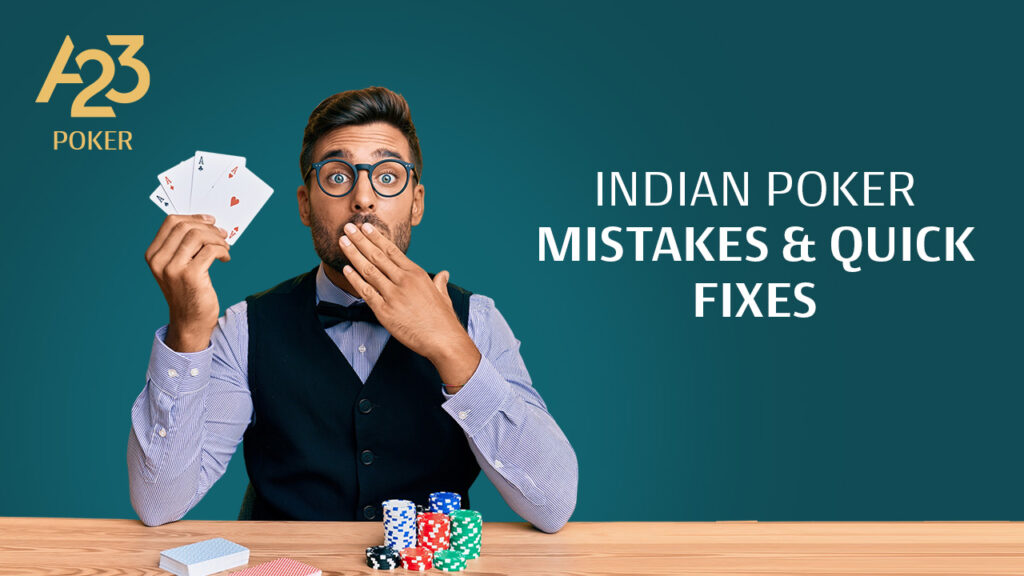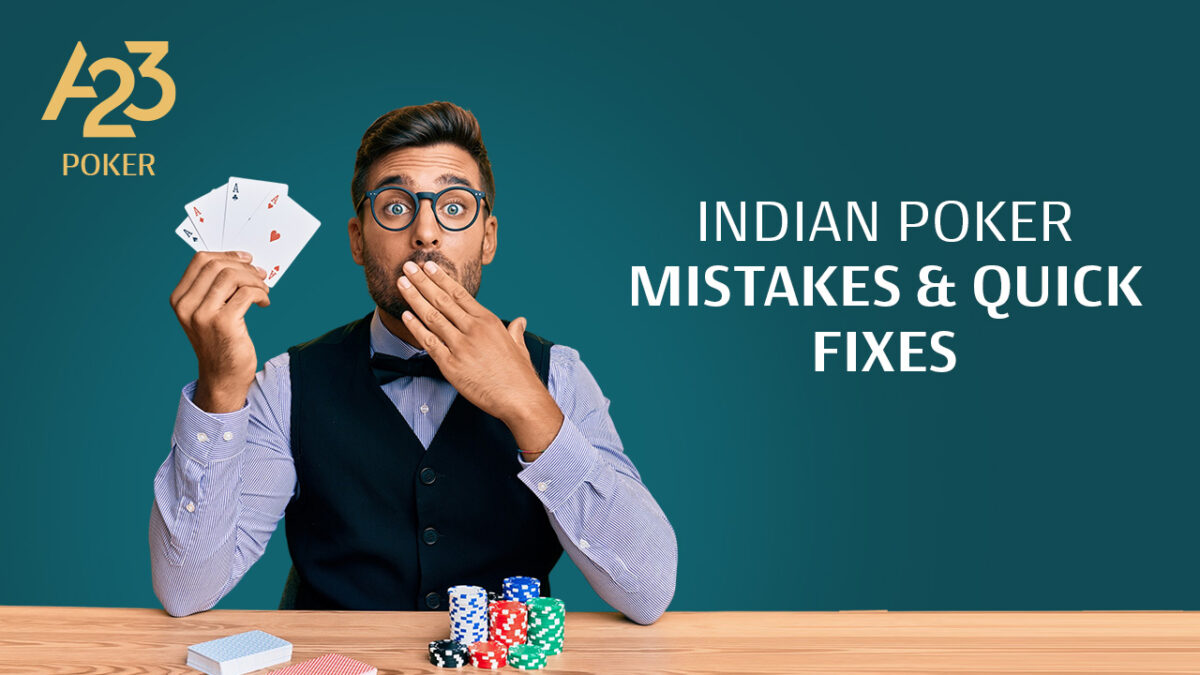
If you are aware of card games played in India, you have surely come across Indian poker. Indian poker – alternatively known as the ‘Blind Man’s Bluff’, is a fun variant of the poker game, which has a simpler rule structure that even beginners can grasp. Poker games are becoming fairly common in Indian society and many skilled Indian poker players are now participating in some of the most coveted poker tournaments in the global stage.
You would need a complete strategic understanding of Indian poker to understand the game’s initial objective. This article will explore the key mistakes to avoid while playing Indian poker and will also highlight how to improve your gameplay. So, let’s begin with the basic things.
What is Indian Poker?
Indian poker is way different from the traditional variant of poker game. Using a 52-card deck, 2 to 8 players can play this game.
Players and Cards
In the Indian poker game, jokers are not mainly used. Each of the players gets a single card faced down on the table. In some different variations of the poker game, different card suits have different card ranks. For example, Spades are considered the highest ranked cards, followed by the Hearts, Diamonds and Clubs.
Game Objective
The objective of the game is to win the pot with the highest value card. The unique gameplay of this card game has made it one of the most popular poker variants.
Basic Gameplay
After the dealer deals one hole card to each of the players, the first round of the game begins. Subsequently, players reveal their cards by facing them up or putting them on their foreheads. This way, all the other players can see each other’s cards but can not see their own.
Following this, the players put chips on as the betting round begins. In this stage, players can call, raise, or fold like in a traditional poker game. Participating players place stakes depending on the visible card while anticipating the value of their card.
Hand Ranking
The hand ranking in Indian poker is a bit different from traditional poker games. In this variant of poker, Ace takes the highest value and is followed by King, Queen and Jack. The numbered cards come after that.
Why is Strategy Important in Playing Indian Poker?
In Indian poker, the strategy of understanding the rankings and the card value is important. However, many players can try their luck and stay in the pot even if they are holding low-ranking cards. Here comes the role of strategy while playing Indian poker. Without knowing the right strategy, you can not play Indian poker or bluff effectively.
Maximizing Wins
Apprehend the value of different hands by reviewing the opponent’s body language and actions. You will be able to make decisions depending on your hands. Do not blindly bluff or aggressively bet to ensure your winning.
Exploiting Opponent’s Weaknesses
If you have a strategy, you can exploit your opponent’s moves by forcing them to play wrong moves. This way, you will be able to understand the gameplay pattern of your opponent.
Improved Decision-Making skills
Without a strategy, you can not decide whether you need to call, raise or fold. Unsuccessful calls and raises will increase your loss. Moreover, Indian poker demands high strategic inputs from you where you will be able to analyze the current situation of the game.
Common Mistakes You Must Avoid
Inexperienced players make mistakes with aggressive gameplay and make decisions that influence their gameplay massively. Unlike regular poker, you can not organize your hands in Indian poker. Some frequent mistakes that beginner players make are listed below. Moreover, we have also discussed the potential fixes for the errors where you can improve your gameplay.
Playing without a Strategy
No game can be won without a strategy. Similarly, in Indian poker, if you play too many hands without a fixed strategy, you are going to lose the round. Hence, before calling or raising, know the strength of your hand.
A basic yet effective strategy for this is to read the opponent’s hands and body language. In Indian poker, you need to make adjustments in your stake considering the poker game’s ongoing situation.
Ignoring the Body Language of Opponent
Without reading the physical cues from your opponent, you can not understand how they are going to play. In Indian poker, since you can see the card of your opponent, you need to guess whether you should call or raise your hand. Since you do not know your card, there is a fifty-fifty chance you may win or lose the round.
Failing to Use Bluffing
Bluffing is a key part of poker, in general. While bluffing you can intentionally raise or call by tricking your opponents into thinking that you have a stronger hand. You can also bluff in Indian poker by focusing more on the opponent’s card. You may lose some rounds initially, but you can win later on. However, you can not use this strategy unnecessarily as bluffing at the wrong time can backfire to you.
A general strategy to bluff effectively is to mix it up with your genuine hand so that it does not create suspicion among other players.
Wrong Estimation of Cards
Do not overestimate your card to be the highest-ranking card in the round. Since you can not see the card you are holding, you can bet or fold depending on your opponent’s cards.
If your opponents have high-rank cards like Ace, Kings or Jacks, you may want to fold without taking a risk. However, if they hold comparatively low-value cards, you can call or raise them.
Not Knowing Different Game Variations
Not every poker variant has the same rules or hand rankings. For example, in Indian poker itself, there is a variant where different card suits have different rankings. Moreover, there are also different house rules of the game, not knowing which will not help you in the gameplay.
Impatience and Lack of Emotional Control
Indian poker is an entertaining game. But, every card game demands your focus and patience. Losing consecutive hands can impact your psyche and make you impatient which will lead to poor decision-making. In other words, your emotions should not be allowed to dictate your gameplay.
Do not make decisions out of emotional imbalance. Rather, make decisions using your composed mind.
If you are feeling impatient, you can get a list of poker books here which will help you to learn new strategies and make you better in the game.
Final Words
Indian poker is very famous amongst poker players. Still, new players or beginners make mistakes in implementing strategies or taking the right actions. However, if you know how to play poker, you will not face many difficulties in playing this variant of the game. Most importantly, you should not rush about the game and make every move by calculating your odds of success. Try to bluff at a suitable time to avoid your opponent getting the better of you.
Overestimation is another mistake which you should avoid at any cost. Finally, there is no shame in pulling out if you do not have the suitable cards to survive in the round. Folding at the right time will reduce your chances of losing. No player can start winning from the very first hand, so you need not worry if you do not win in the very first round.
So, thinking about starting to learn Indian Poker? Well, it is an exciting variation of the traditional poker game that you will surely enjoy. Go ahead, pick some cards and start playing!





 Apr 8, 2025
Apr 8, 2025
Note: that your message will not be displayed until it is reviewed by the moderator!